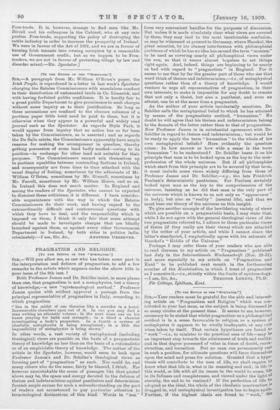PRAGMATISM AND RELIGION. mei , TUX Nnume OF miii. "episcv,ToR:1 SIR,—Will you
allow me, as one who has taken some part in the interpretation and defence of pragmatism, to add a few remarks to the article which appears under the above title in your issue of the 9th inst. P Both Professor James and Dr. Schiller insist, in more places than one, that pragmatism is not a metaphysics, but a theory of knowledge,—a new "epistemological method." Professor James quotes with evident approval a passage from the principal representative of pragmatism in Italy, according to which pragmatism "lies in the midst of our theories like a corridor in a hotel. Innumerable chambers open out of it. In one you may find a man writing an atheistic volume ; in the next some one on his knees praying for faith and strength ; in a third a chemist investigating a body's properties. In a fourth a system of idealistic metaphysics is being excogitated ; in a fifth the impossibility of metaphysics is being shown."
In other words, a vast variety of metaphysical (including theological) views are possible on the basis of a pragmatistic theory of knowledge no less than on the basis of a rationalistic or of an empiricistic theory of knowledge. The author of the article in the Spectator, however, would seem to look upon Professor James's and Dr. Schiller's theological views as forming part of "pragmatism" as such. Nor could he, and many others who do the same, fairly be blamed, I think. For however unmistakable the sense a passages like that quoted above may be, the space and energy devoted to the defence of theism and indeterminism against pantheism and determinism furnish ample excuse for such a misunderstanding on the part of readers not accustomed to pay particular attention to terminological distinctions of this kind. Words in " ism " form very convenient handles for the purposes of discussion. But unless it is made absolutely clear what views are covered by them, they may lead to the most inextricable confusion, as may be witnessed at present in Germany, where Haeckel, the great scientist, by his clumsy interference with philosophiCal problems of which he has no idea has caused the term "monism" to be used as covering nearly all philosophical views under the sun, so that it seems almost hopeless to set things right again. And, indeed, things are beginning to be nearly as bad with regard to " pragmatism " in England. For it seems to me that by far the greater part of those who use that word think of theism and indeterminism,—i.e., of metaphysical questions rather than of a theory of knowledge. I would venture to urge all representatives of pragmatism, in their own interests, to make it impossible for any doubt to remain that not only a theist, but also a pantheist, and even an atheist, can be at the same time a pragmatist.
As the author of your article incidentally mentions, Dr. Schiller calls the metaphysical belief to which he has attained by means of the pragmatistic method, "humanism." No doubt he will agree that his theism and indeterminism belong to the domain of the latter rather than to that of pragmatism. Now Professor James is in substantial agreement with Dr. Schiller in regard to theism and indeterminism ; but would he be ready to apply the term " humanism " to the whole of his own metaphysical beliefs P Here evidently the question arises : In how narrow or how wide a sense is the term " humanism " to be understood P Dr. Schiller bases it on his principle that man is to be looked upon as the key to the com- prehension of the whole universe. But if all philosophies which start from this principle are to be aovered by that term, it must include some views widely differing from those of Professor James and Dr. Soltiller,—e.g., the late Friedrich Paulsen's deterministic pantheism. For Paulsen certainly looked upon man as the key to the comprehension of the universe, insisting as he did that man is the only part of the universe which is known to us not only as " appearance " (a body), but also as " reality " (mental life), and that we must base our theory of the universe on this insight.
To give another example of the bewildering variety of views which are possible on a pragmatistic basis, I may state that, while I do not agree with the general theological views of the two pragmatists referred to, I adhere to those particular views of theirs (if they really are their views) which are attacked by the writer of your article, and while I cannot share the letter's standpoint, I emphatically agree with his estimate of Haeckel's "Riddle of the Universe."
Perhaps I may refer those of your readers who are able to read German to my article on " Pragmatism " published last July in the Internationale Wochenschrift (Nos. 29-31), and more especially to my article on "Pragmatism and Kant" to be published next month in the forthcoming number of the Kantstudien, in which I treat of pragmatism as I conceive it,—i.e., strictly within the limits of epistemology.




































 Previous page
Previous page